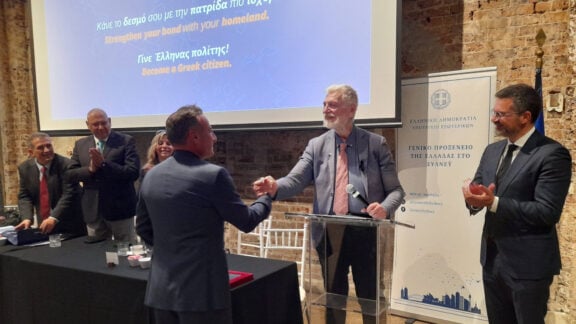Sea, Black Sea
Don’t become a monster
Calm your waters …
So that this ship
Can take me to Greece
Genocide – who’s counting?
For decades my relatives have been asking me when will I write about the genocide of our Pontian people in 1914?
“You know that there were 600,000 in the Pontus, 200,000 were slaughtered, 200,000 died by diseases during their exile from Trabzon.
“Only two hundred thousand made it to Greece” many would say
Over the last few weeks, the death count of the genocide has been much debated on social media. How many deaths make a genocide? Was it a systematic exercise in ethnic cleansing, or a series of senseless revenge attacks?
My maternal grandparents where among the fortunate ones who survived.
But for a long time, I had no idea on how to approach the story of the Pontian genocide.
I was staring at a dog. His chin was resting on his crossed paws. He was deep in a sleep and dribbling deeper in dreams. I am sure he was dreaming of a life when no-one was running.
Suddenly, it came to me I should write about this history as a series of letters. I had this twitching anxiety: who writes letters these days? And yet, even an email which is written with either much longed eros, or by means of a well-measured estimation can be savoured, read again and again, held forever in memory. In those carefully ordered words, one can make a site that suspends time and space — beckons eternity.
Letters across time: From a Library in Venice to a kitchen in Greece
The letters on the Pontian genocide will be addressed to my maternal grandmother Hariklia and to Cardinal Bessarion.
Bessarion was in Italy when Constantinople was captured by the Ottomans in 1453. Hariklia was a little girl when her family were displaced from their village in Trabzon in 1923.
Hariklia was illiterate and refused to talk about the horror of that exodus. The blue aerogrammes my mother sent to her were read by a neighbour and then disposed in the kitchen fire. Her responses were dictated in a perfunctory manner – “my darling children, your eyes I sweetly kiss, all is well”.
Bessarion was pulled from village life by the priest in Trabzon. He received the best education in the monasteries of Constantinople and Mystra and almost became Pope. None of his 14 siblings lived to adulthood. Bessarion was a great scholar who created one of the greatest libraries and rescued many other philosophers. He was the funnel through which the knowledge passed to produce the Italian renaissance.
Two voices, two silences
My first impression of Bessarion was gained when I stared at a portrait of him as the model for St Jerome in Carpaccio’s painting in the Venetian Scuola San Giorgio degli Schiavoni. There is now a vast body of writing on Bessarion, and the Venetians built a majestic library to house his collection of manuscripts. Last summer I was given access to this library because my host implied that Bessarion was my ancestor.
Bessarion I can see clearly. The contours of his life were shaped by the struggle to preserve the knowledge of antiquity and the luminous legacy of the Byzantium. He fought Christian dogma and riled against the stigmatic mindset of ‘our’ Western allies. He is my ancestor in thought.

Memory against forgetting
Hariklia is a deeper mystery. She was a perceptive judge of character but almost a mute. In the 1990s I would visit her almost every summer. She shooed away questions about her life in Trabzon as if they were annoying flies.
Then one afternoon she asked, “Where I have you been all day?”
“At the kafenion talking to Maki.” I answered.
“Why were you talking to that fool?”
“Actually, he was telling me about his childhood in Trabzon.”
“Don’t listen to an idiot like him. He does not know anything. That is not how things were.”
Then she told me about her childhood years in Trabzon. I wrote it all down, in neat script. I realized that I might have fluked a way into her memories.
The following afternoon I returned home just as late as the previous day.
Again, Hariklia pounded me with an inquisition on who I spent time with at the kafenion.
“Kostas had some very sad stories about the boat trip from Trabzon to Thessaloniki, and the quarantine in Kalamaria, that was followed by the long camel trek to Mesopotamia.”
“Why do you listen to a liar like him?”
Once again, in opposition to the men in the kafenion, my grandmother revealed the stories of her exodus. This will be my next book.
*Prof. Nikos Papastergiadis, is a cultural historian and author of many books; his recent one is ‘John Berger and Me’.







